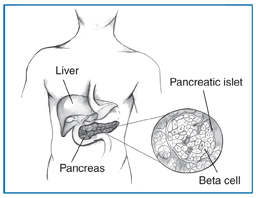What Causes Diabetes?
Diabetes is a common disease that is brought about by many different factors. Diabetics also suffer from high blood pressure or hyperglycemia as it is medically called.
This condition is a disorder of the metabolic system. This is because it starts developing the moment the body cannot produce enough insulin or use it up effectively. Sometimes it can also be due to both of these scenarios. Where exactly is this insulin produced? The pancreas is responsible for its production. It has clusters of cells referred to as islets whose constituent beta cells make insulin.
Given that beta cells produce insulin, it is upon the body to use it up. However, it is also possible that these cells do not produce enough insulin. When this happens, one can either be diagnosed with pre diabetes or diabetes.
Pre diabetes refers to a condition where the average blood glucose levels are higher than normal but not too extreme to be diagnosed as diabetes. This is different from diabetes because the body’s cells still have some energy.
Effects of Diabetes
When an individual has had diabetes for a long time, the high blood glucose damages nerves and blood vessels. This can lead to complications like heart diseases, kidney diseases, stroke, blindness and even amputations in extreme cases. People with diabetes are also susceptible to other diseases, decrease and even loss of motion, depression, aging and pregnancy issues. What causes diabetes? While no one can pinpoint the definite cause of this condition, scientists attribute it to genetics and the environment.
Types of Diabetes
There are two principal kinds of diabetes; type 1 and type 2. The other common one only develops in pregnant women, and it is known as gestational diabetes. Even though type 1 and 2 are different, there are also people who exhibit symptoms of both of them.
Causes of Type 1 Diabetes
Type 1 diabetes results from low production of insulin. This happens when the beta cells are damaged normally by the body’s immune system. This makes it an autoimmune disease. The destruction can go on for several years although someone can start showing the symptoms after a very short period. Even though it attacks people of all ages, it is prevalent in children and young adults. This is actually the reason it also called juvenile diabetes or insulin-dependent diabetes mellitus.
Adults who are around 30 years of age also tend to develop a form of type 1 diabetes called latent autoimmune diabetes in adults. It develops slowly and even though those individuals still produce insulin, they will need insulin shots later on in life.
Heredity and Diabetes
A person’s genetic makeup has a very big role to play when it comes to developing type 1 diabetes. Parents pass down genes to their offspring, and it is these genes that influence susceptibility to type 1 diabetes. There are gene variants that are responsible for the formation of proteins called human leukocyte antigens (HLA). It is the proteins produced by HLA genes that dictate whether the body will turn against some cells thinking they are foreign objects or not. Some variants of this gene also determine whether a person will have type 1 diabetes.
HLA genes are not the only one responsible for type 1 diabetes. There are also many other risk genes and gene regions that cause the condition. Luckily, genetic testing can identify the types of HLA genes that one carries and tell if they can lead to diabetes. Scientists are also busy trying to figure out how genetic testing results can be used for prevention and treatment of type 1 diabetes.
Autoimmune Destruction of Beta Cells
 T cells attack and damage beta cells in type 1 diabetes. When this is happening, someone cannot easily tell and diagnosis only come in late when the cells have been destroyed, and the patient has to start using insulin shots. Studies have shown that the insulin itself can actually be a trigger for the attack on beta cells.
T cells attack and damage beta cells in type 1 diabetes. When this is happening, someone cannot easily tell and diagnosis only come in late when the cells have been destroyed, and the patient has to start using insulin shots. Studies have shown that the insulin itself can actually be a trigger for the attack on beta cells.
Environmental Factors
Foods, viruses, and toxins are also common environmental factors that cause type 1 diabetes. While the exact way in which they do this has not been established, some studies indicate that they trigger the autoimmune destruction of beta cells. Viruses can also cause type 1 diabetes although many people are also diagnosed with this condition after a viral infection.
Breastfeeding practices for infants are also believed to cause diabetes. For example, infants who breastfeed regularly have sufficient amounts of vitamin D and are less susceptible to type 1 diabetes. On the other hand, earlier exposure to cow’s milk and cereal proteins increases the susceptibility to type 1 diabetes.
